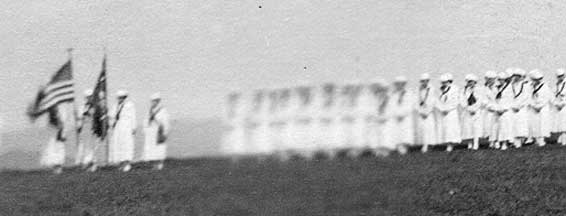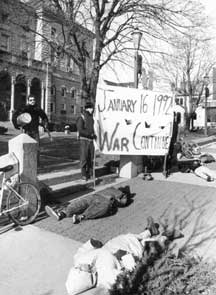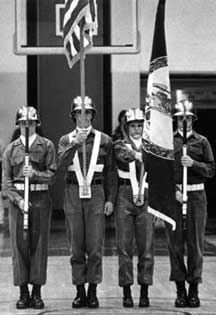Like any other institution, JMU has been profoundly affected by war over the past century. Even the university's namesake, President James Madison, was drawn into war though he opposed it. Backed by the “War Hawks,” he declared war against Great Britain on June 18, 1812. The War of 1812 was etched in the annals of American history when the White House was set ablaze and Fort McHenry was mercilessly bombed, memorialized by Francis Scott Key in the “Star Spangled Banner.”
 |
|---|
| Normal School students parade just after World War I. |
World War I
When President Woodrow Wilson sent General John Pershing's troops to Paris in April 1917, the YWCA held a special vespers service on campus to support troops. War efforts included Red Cross Auxiliary classes, taught by music teacher Elizabeth Harris, which instructed “the Normal ” girls in surgical dressings and knitting sweaters for soldiers. First aid classes were taught by the superintendent of nurses at Rockingham Memorial Hospital, open to town and Normal School students. Culinary classes instructed students how to make “war bread,” “potato biscuits,” and oatmeal muffins—in essence, how to cook palatable meals without flour, sugar, or butter.
Additionally, girls learned the hard way to eat without fish or meat—“use-without-waste” was part of the Normal school girl's patriotic duty. H. Mae Hoover ('18) recalled that the campus was shadowed by the presence of war in many ways: news by mail of loved ones affected by the war, songs like “Keep the Home Fires Burning,” and parades supporting the sale of War Bonds. Women marched in Red Cross parades in red and white hats until the war's end on November 11, 1918.
That fall semester before the Great War ended, the Normal School suffered another tragedy—the flu epidemic. From the first day of classes, September 25, 1918, to the first week of November, “the Spanish flue” which was sweeping the nation slowed campus activities to a halt.
“So many girls were sick that Jackson Hall was, bit by bit, turned into an infirmary—half of the first floor at first, then all of that floor, and then the whole building…[after the regular infirmary at Cleveland College was filled]. President Burruss, himself, came down with the flu on Tuesday, October 1, and was confined to his room for three weeks….Appeals to the State Health Commission were virtually fruitless” (Dr. Raymond Dingledine Jr., “Madison College, the First Fifty Years).
Classes were suspended between October 7 and November 5. Many churches and stores had already been closed. Healthy students, besides those who assisted in the infirmaries, were sent home.
Fortunately, not a single life was lost to flu at the Normal. In comparison, nearly ten times more Americans died of influenza than on the battlefield in October 1918 – 21,000 civilians died on the home front and 2,700 American soldiers lost their lives in patriotic service.
After the war, President Burruss, a former cadet at Virginia Polytechnic Institute, insisted on military drilling to teach precision marching. He organized the girls into a battalion of four companies. Their training culminated in a parade on Field Day, after which Company B was judged by local military men as the best and designated as color bearers for the June graduation.
World War II
After the attack on Pearl Harbor in 1941, Madison College President Samuel Page Duke announced a leave for faculty and staff joining the military. Eight people from Madison 's ranks answered his call and were staunchly supported by students who bought defense stamps, knit wool squares, and collected tin foil and tin cans. The campus held together in their war efforts as the war took its toll. One club, the Stratford Players, lost two consecutive advisors in Naval Service, Dr. Argus Tresidder and Dr. Leland Schubert. Some students quit school to marry Europe-bound sweethearts and others joined the service themselves.
Other soldiers returned to JMU with stories to tell. Rev. Dr. William L. Mengebier, head of the biology department from 1954 to 1968, was awarded a Silver Star and Bronze Star with cluster for his service in Europe with the 104 th Infantry Division.
English professor Geoffrey Morley-Mower, before he came to JMU, was a Hawker Hurricane fighter pilot in the British RAF. He was awarded the Distinguished Flying Cross by King George VI in 1944, one of the few pilots who wore eyeglasses to earn flight wings. He wrote several books about his experiences, including Flying Blind.
Although not a JMU graduate or faculty, Bob Plecker is well known in JMU history for his $2 million donation to JMU which enabled construction of the Robert and Frances Plecker Athletic Performance Center. During WWII, Plecker was a platoon leader in the Parachute Infantry and fought in the Battle of the Bulge.
In 2003, US Army Medical Corps Veteran and Madison alumna Emily Lee Lewis ('43) donated $50,000 to establish the World War II garden patio memorial at the Leelou Alumni Center. The patio includes a bronze plaque, benches, and flowers. Inside the alumni center is another plaque of 110 names, honoring JMU alumni and friends who served America in WWII. In April of that year, Lee and more than 300 alumni gathered for Reunion Weekend and shared memories in the annual Madison Confessionals program.
Vietnam
During Vietnam, professors were often torn between upholding academic standards and granting leniency toward a potential draftee. October 15, 1969, was the national Vietnam Moratorium Day. That day, open panel discussions between students and faculty were held throughout the day in Wilson Auditorium. Attendance ranged from 50 to 200 at any given time.
That night, the names of Virginians who had died in Vietnam were read on the Quad, followed by prayers. Some 150-200 students in attendance silently walked from one end of the campus to the other and then dispersed peaceably.
 |
|---|
| Protestors on anniversary of Persian Gulf War |
Middle East and Africa
During recent wars in the Middle East and West Africa, JMU has consistently provided information, debate and troop support. The Nelson Institute for International and Public Affairs, the Mahatma Gandhi Center for Global Nonviolence, the Guardian Lecture Series, the Visiting Scholars Program and the U.S. Army War College have all hosted JMU lectures, panel discussions, debates and classes given by notable speakers such as Nelson Institute director Dr. J. Peter Pham, author Charles Peña, alumnus and counterterrorism scholar Mike Tucker (BA '92, MA '99), former U.S. Ambassador William Milam, CNN journalist Walter Rodgers, former Prosecutor of the Special Court for Sierra Leone David M. Crane and author Dr. Bradley A. Thayer.
Madison Online's website Operation Purple Pride is an important forum for updates and diaries by JMU alumni troops serving in Afghanistan and Iraq.
In April of 2003, the student organization OrangeBand dedicated to increasing student political involvement hosted a forum on the war in Iraq which was broadcast on C-SPAN. Three undergraduate Reserves soldiers shared their experiences from recent tours in Iraq and both troop supporters and protesters peaceably shared opinions and information.
 |
|---|
| ROTC color guard |
JMU's award-winning Army ROTC program began in 1975 and achieved full-time status in 1979. The Dukes Battalion earned the coveted MacArthur Award in 2005 as the Best Large Battalion east of the Mississippi River.
In addition to JMU students who continually serve abroad in the Middle East, students like Jose Gonzalez have also taken individual initiative in global conflicts. Gonzalez ('03) was awarded a one-year fellowship by the Foundation for the Defense of Democracies “to increase awareness about terrorism at JMU.” This fellowship enabled Gonzalez to travel to Israel and bring back first-hand knowledge of Middle East conflicts. Gonzalez also organized JMU's 2002 9/11 Day of Remembrance.
JMU continues to honor veterans who have served our country. In 2006, the old Harrisonburg High School was purchased by the university and renamed Memorial Hall.
--August Smith
